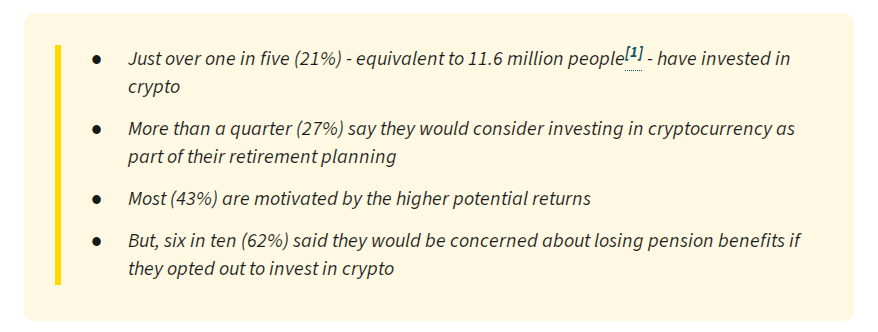Crypto In Your Golden Years? 27% Of British Adults Say Yes - Here’s Why
Retirement portfolios are getting a digital upgrade—and traditional finance isn't invited.
Why Brits Are Betting On Bitcoin
Nearly a third of UK adults now see cryptocurrency as a legitimate retirement asset class. They're ditching bonds for blockchain, swapping annuities for altcoins. This isn't just millennial madness—it's a structural shift in how generations view wealth preservation.
The Pension Revolution
Forget what your financial advisor told you. Digital assets offer something traditional investments can't: true ownership, 24/7 markets, and resistance to inflationary monetary policies. While the FSA frets about regulation, everyday investors are building their own pension schemes—one satoshi at a time.
Golden Years Or Fool's Gold?
Sure, volatility remains. But when fiat currencies lose purchasing power yearly, that 10% dip looks more like a buying opportunity than a risk. Traditional finance will call it reckless—right before launching another crypto ETF for their wealthy clients. The future of retirement isn't in some fund manager's hands—it's in your wallet.
Growing Appetite Despite Worries
Based on reports from Censuswide, which polled 2,000 UK adults between June 4 and June 6, more than four in five people hold pensions that add up to about £3.8 trillion ($5.10 trillion).
If even a small slice of that moved into crypto, it could be meaningful for markets. Of the respondents who said they were open to digital currency in pensions, just over 40% pointed to the chance of higher returns as the main draw.
UK retirement savers warm to crypto. A new Aviva survey finds 27% of UK adults WOULD include crypto in retirement, hinting at future flows from a multi-trillion pound pension market.
‣ 27% open to crypto in pensions, per @Censuswide polling for Aviva ‣ 23% would even shift… pic.twitter.com/9xejvGEIGh
— TrinityPad (@Trinity_Pad) August 27, 2025
Younger Savers Lead The Shift
Younger adults appear to be the most active. Reports show nearly 20% of people aged 25 to 34 admitted to withdrawing pension money to buy crypto at some point.
Aviva’s research also found that about one in five UK adults — roughly 11.5 million people — have held crypto at some time, and two-thirds of that group still hold some FORM of digital asset.

That mix of ownership and age-skewed behavior helps explain why digital currency is now part of conversations about retirement planning.
Survey participants flagged clear concerns. Hacking and phishing topped the list at 40%, while 37% cited a lack of regulation and consumer protection, and 30% named volatility.
Almost one-third admitted they didn’t completely grasp the trade-offs involved in replacing pensions with bitcoin, and 27% said they were unaware of any risks at all. Those numbers suggest interest outpaces understanding for a notable share of the public.
Regulation will likely play a large role in how fast any shift happens. Reports note that HM Revenue and Customs will require crypto platforms to collect full names, home addresses, and tax identification numbers for every trade and transfer starting January 1, 2026. That MOVE is aimed at strengthening tax compliance and oversight and could change how some consumers view bitcoin’s privacy and convenience.
US Policy Also Moves The NeedleThe debate over retirement funds and crypto is not confined to the UK. US President Donald Trump signed an executive order allowing 401(k) plans to include Bitcoin and other cryptocurrencies, opening potential access to more than $9 trillion in retirement assets.
Featured image from Getty Images, chart from TradingView

